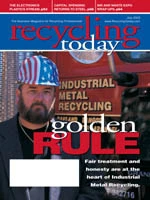LEONARD SCHNITZER DIES AT 78
Leonard Schnitzer, chairman of Schnitzer Steel Industries Inc., Portland, Ore., and son of the company’s founder Sam Schnitzer, has died at age 78.
He grew up learning the scrap business (along with his brothers) from his father Sam, before attending dental school and serving as a U.S. Navy dentist during the Korean War.
Leonard joined the family business before the Korean War in 1946 and re-joined after his Naval stint. He rose through the company ranks to become chairman in 1971 and CEO from 1973 until Jan. 1, 2002.
Under Leonard’s leadership, Schnitzer Steel Industries became a publicly traded company handling more than 4.5 million tons per year of scrap metal and shipping globally. He also steered the company into several joint ventures as well as into other industries altogether, starting the Lasco Shipping Co. in the early 1960s and acquiring Cascade Steel Rolling Mills Inc., an electric arc furnace steelmaker, in 1984.
Scrap remained at the heart of the business and led to the additional opportunities, Leonard told Recycling Today in a 1992 interview. "Everything we are into, in one way or another, is an outgrowth of our scrap trading and processing business. It was the seed that led us to all these other opportunities."
He is survived by his wife of 41 years, Lois, sisters Edith and Mollie, brothers Gilbert and Harold, six daughters, four sons-in-law and 13 grandchildren.
The family requests donations in Leonard’s memory be sent to either the Cancer Care Resource Center in Portland or the Congregation Beth Israel or the Congregation Shaarie Torah in Portland.
PHILIP FILES CHAPTER 11
Philip Services Corp. (PSC), Houston, and most of its wholly owned U.S. subsidiaries have filed voluntary petitions under Chapter 11 of the Federal Bankruptcy Code. The filings took place June 2.
"Our existing debt is too high for our businesses," says Robert Knauss, PSC principal executive officer and chairman of the board. "We currently have funding available, which will permit us to continue to operate while we pursue strategic alternatives."
Among those strategic alternatives is the sale of assets and locations, including a number of scrap processing facilities in North America. "Our primary avenue is to pursue a sale of all or substantially all the assets of the company as a going concern pursuant to Section 363 of the Bankruptcy Code," says Knauss. "We will seek bids in the market place for the company as a whole or by strategic operational unit and expect to present the highest and best bid or bids to the Court in August."
BLACK INK FOR METAL MANAGEMENT IN 2003
Metal Management Inc., Chicago, has announced results for its fiscal year and fourth quarter period that ended March 31, 2003.
For its 2003 fiscal year, the scrap recycling firm has reported consolidated net sales totaling $770.0 million with net income of $20.5 million, or $1.98 per common diluted share for the year.
For its most recent quarter, net sales increased by more than 28 percent to $214.2 million while net income grew by more than 200 percent to $7.1 million compared to the same quarter last year.
The company also says its debt was reduced by $44 million in the recently concluded fiscal year.
"The company is very pleased with our results in the fourth quarter and for the full fiscal year," says Albert A. Cozzi, vice chairman and CEO of the firm.
According to Cozzi, "The company’s total processed ferrous metal shipments were slightly more than 4.1 million tons for the year, an increase of about 200,000 tons from the year-ago period. Conversely, our nonferrous business continues to be negatively affected by the generally weak domestic manufacturing sector, particularly the commercial aerospace and stainless steel markets. Nonetheless, since Metal Management’s ferrous business represents 71 percent of total net sales, our overall results remained solid and we are well positioned for a recovery in the nonferrous markets."
A look at the company’s most recent quarterly filing, published by the Securities and Exchange Commission on June 9, shows some potential corporate control intrigue.
The documents reveal that former Metal Management chairman Ben Jennings, who has not been affiliated with the company for more than two years, has received an unsecured loan of $9.6 million from U.K.-based European Metal Recycling (EMR) to purchase shares on the open market of Metal Management. The loan has helped Jennings acquire 842,000 shares in the company, or about 8.3 percent of total shares. Additionally, EMR owns more shares equal to about 15 percent of overall common stock. The purchases by EMR and Ben Jennings were all made in late May.
Whether the EMR position in Metal Management is a prelude to an upcoming buyout bid remains to be seen. Cozzi reports separately that the company is working toward a long-term credit arrangement. "Also noteworthy is the support of our asset-based lenders who have supported the company for over five years. We recently agreed with our bank group to extend the maturity date of our credit agreement to June 7, 2004, as we explore long-term financing opportunities for the company."
Cozzi adds, "In March 2003, the company’s common stock was readmitted to Nasdaq and listed on the Nasdaq SmallCap Market, a move that should continue to enhance the efficiency and liquidity in the trading of our stock for our shareholders. We are grateful for the confidence and support of our stockholders."
Metal Management is one of the largest metals recycling firms in the U.S., with approximately 40 recycling facilities in 13 states.

Explore the July 2003 Issue
Check out more from this issue and find your next story to read.
Latest from Recycling Today
- SABIC’s Trucircle PE used for greenhouse roofing
- Hydro to add wire rod casthouse in Norway
- Hindalco to invest in copper, aluminum business in India
- Recycled steel price crosses $500 per ton threshold
- Smithers report looks at PCR plastic’s near-term prospects
- Plastics association quantifies US-EU trade dispute impacts
- Nucor expects slimmer profits in early 2025
- CP Group announces new senior vice president






